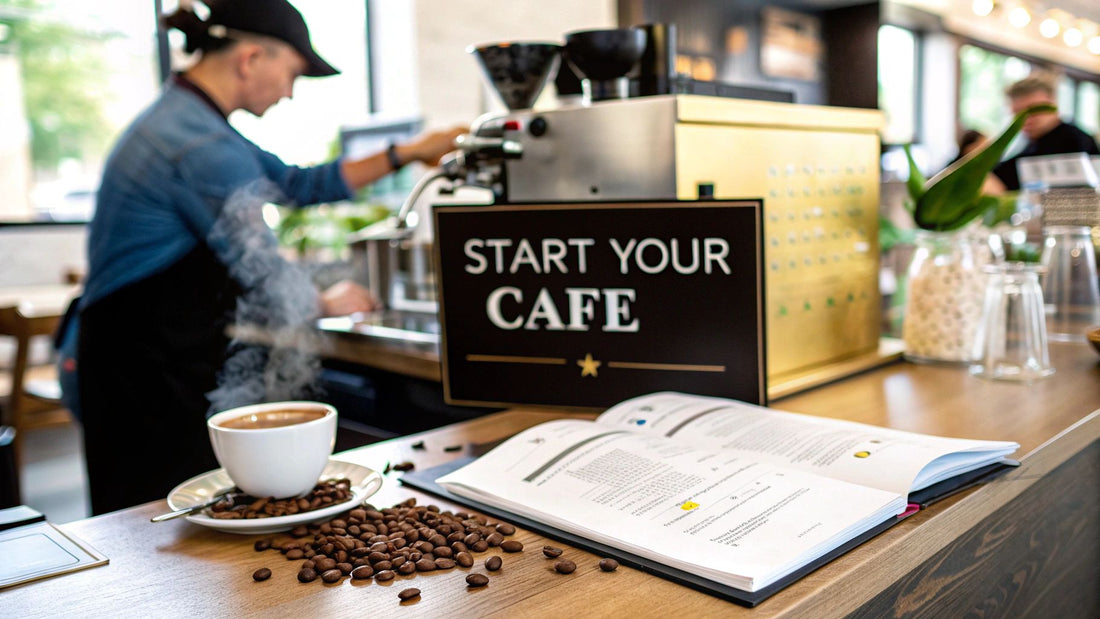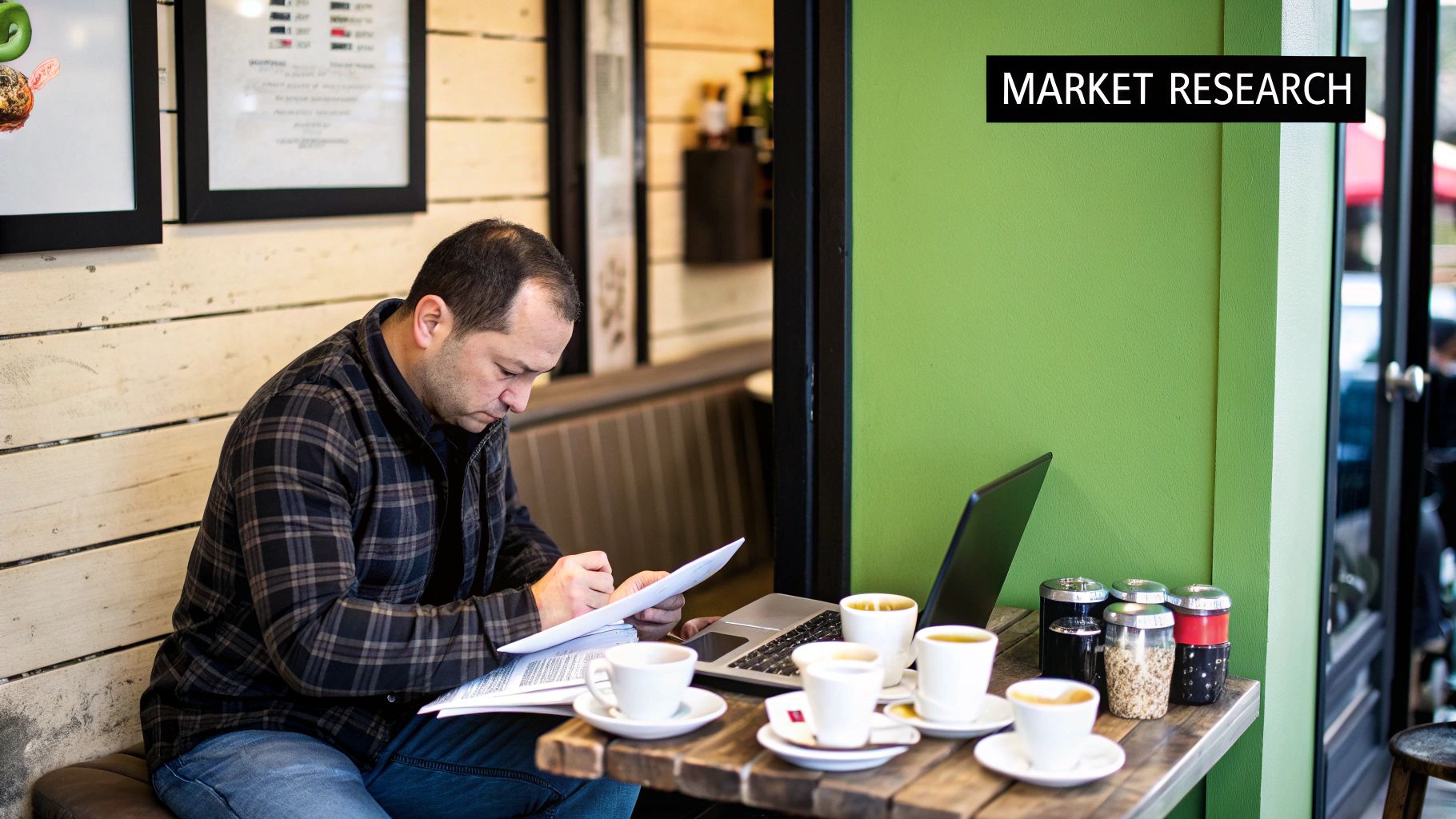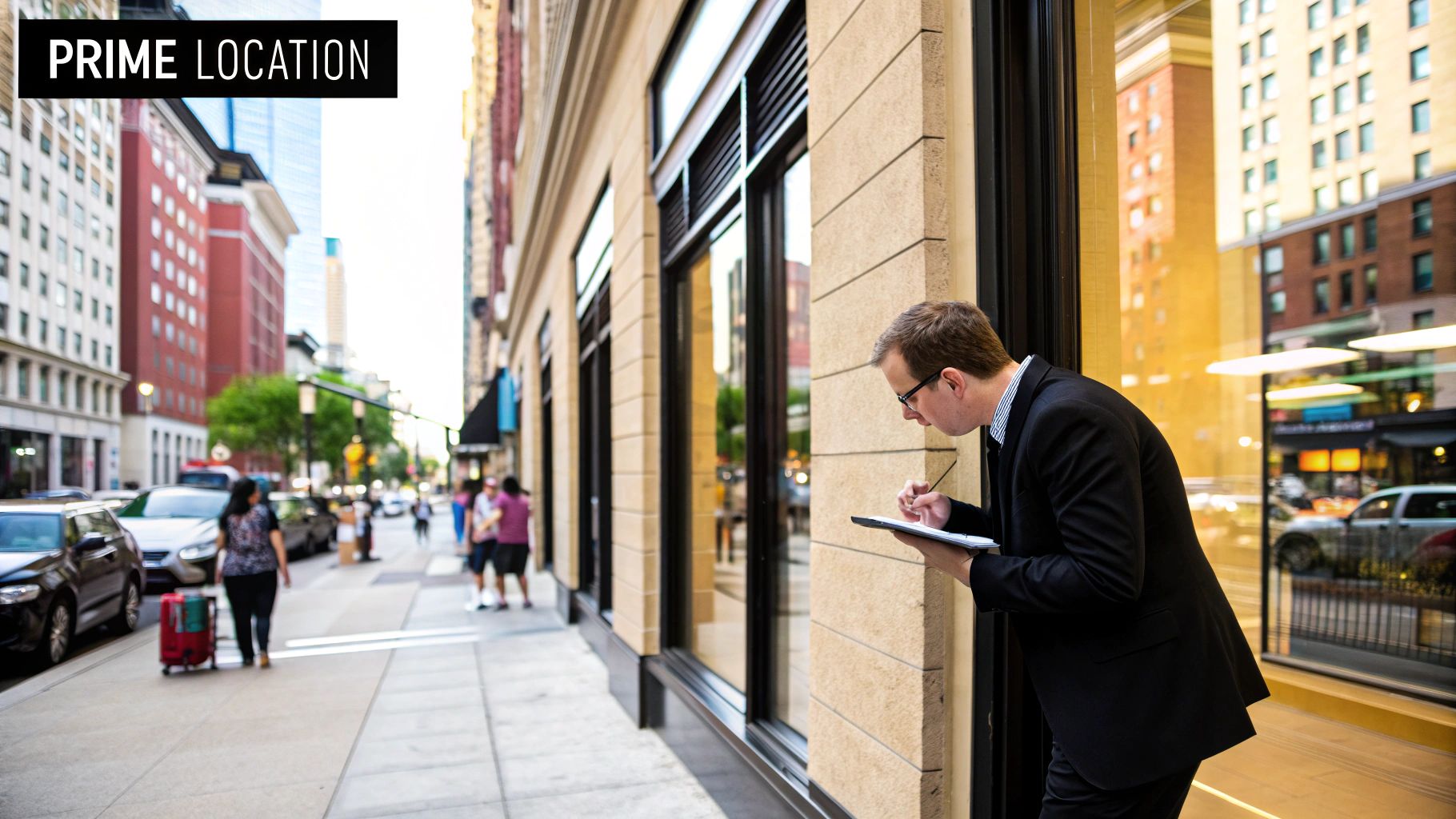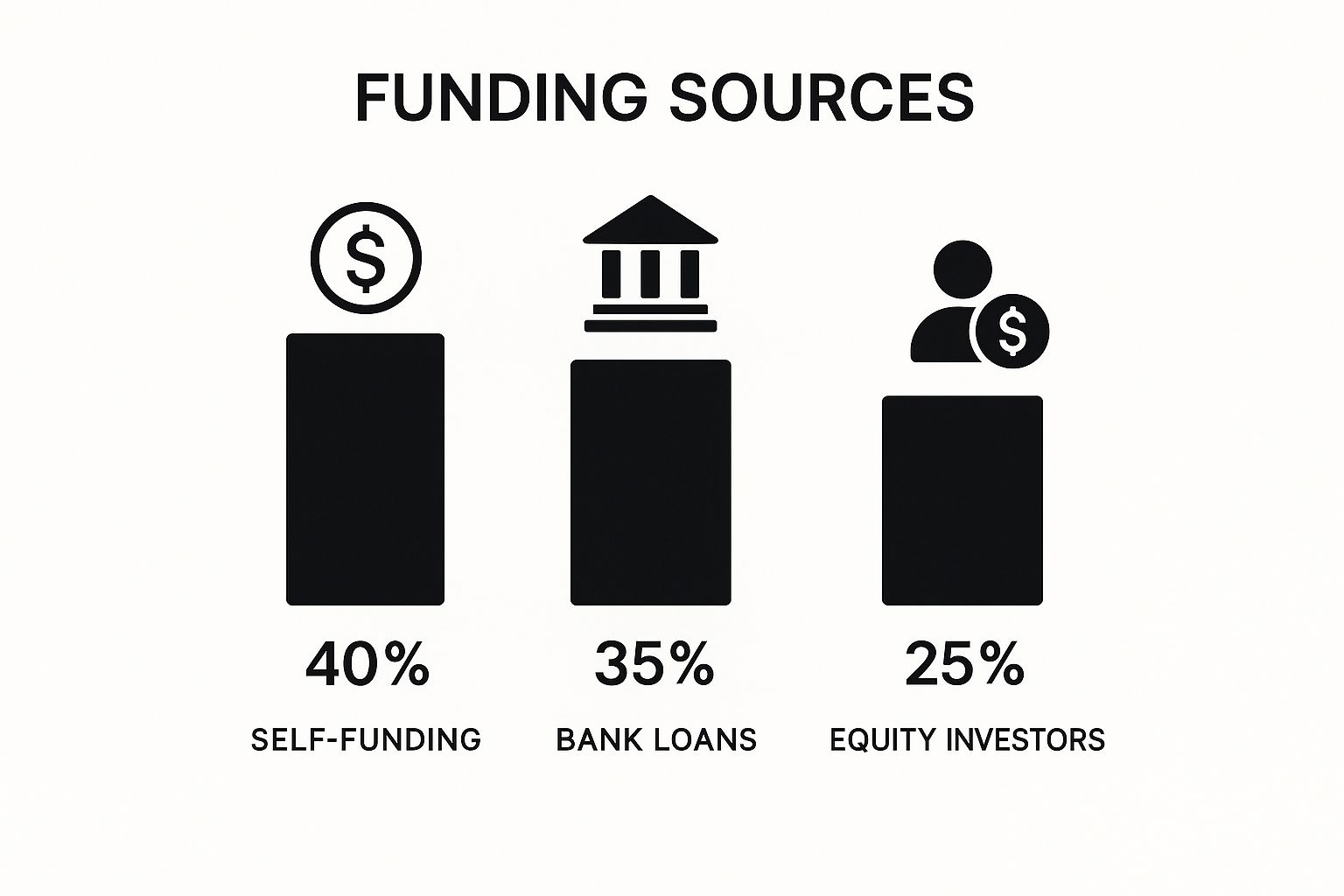
How to Start a Coffee Shop in the UK: Your Complete Guide
Share
So, you’re dreaming of opening your own coffee shop. It's a vision many of us have—the warm buzz of conversation, the rich smell of freshly ground beans, and a place that feels like the heart of the community.
This guide is here to turn that dream into a real, workable plan. We’ll get into the nitty-gritty of building a thriving speciality coffee hub that people will love, from day one.
Your UK Coffee Shop Dream Starts Now

We're moving beyond the romantic ideal to walk you through the entire journey—from sharpening your initial concept to that incredible moment you finally flip the 'Open' sign.
The UK's speciality coffee scene is buzzing with energy and full of opportunities for independent shops that bring something different to the table. Let’s be clear: success isn’t just about pouring a great flat white. It’s about creating a distinct identity, delivering exceptional service, and building a brand that people truly connect with.
The Opportunity in the UK Speciality Market
If you're wondering whether there's still room for another coffee shop, the numbers speak for themselves. The UK coffee market is not just surviving; it's thriving, especially in the speciality sector where quality and provenance are paramount.
The total UK branded coffee shop market is valued at an impressive £6.1 billion, with around 11,456 outlets open across the country after growing by 5.2% in the past year. This proves there’s a massive, passionate customer base ready to embrace new and exciting coffee experiences, particularly from independent, quality-focused businesses. You can dive deeper into these stats in the World Coffee Portal's Project Café UK 2025 report.
The most complimented element is often the branding—after the delicious coffee, of course. A good logo, consistent colours, and a clear aesthetic are crucial for standing out in a competitive market. It makes your business instantly recognisable.
This journey is about more than just business; it's about creating a space where people feel welcome. It’s about building something that reflects your passion and adds genuine value to your neighbourhood.
Before we dive in, let's look at the bigger picture. This table breaks down the entire process into manageable stages, giving you a clear roadmap of the journey ahead.
Your Coffee Shop Startup Roadmap
| Stage | Key Action | Primary Focus |
|---|---|---|
| 1. The Blueprint | Writing a solid business plan. | Defining your vision, brand, and financial projections. |
| 2. Securing Funds | Sourcing startup capital. | Loans, investors, or personal savings. |
| 3. Finding a Home | Scouting and securing the perfect location. | Footfall, demographics, and lease negotiations. |
| 4. The Legal Bits | Navigating licences and regulations. | Food hygiene, business registration, and insurance. |
| 5. Sourcing & Setup | Choosing equipment and suppliers. | Espresso machine, grinders, beans, milk, and pastries. |
| 6. Building a Team | Hiring and training your baristas. | Skill, personality, and creating a positive culture. |
| 7. The Grand Opening | Marketing your launch. | Building hype and attracting your first customers. |
This roadmap isn't just a to-do list; it's the foundation for building a business that lasts. With passion and a solid strategy, your vision can become a beloved local landmark.
Let’s get started.
Building a Business Plan That Gets Funded

A great idea for a coffee shop is just the start. To make it real, you need a business plan. Think of it less like a stuffy document and more like your personal roadmap—the tool that turns your dream into something tangible that banks and investors in the UK will actually back.
Without this blueprint, you're essentially flying blind. A solid plan forces you to get brutally honest about every detail, from the vibe of your shop to the hard numbers that prove it can turn a profit. It’s what separates the dreamers from the doers.
Defining Your Unique Selling Proposition
What's going to make someone walk past three other cafés to get to yours? That's your Unique Selling Proposition (USP). It's the heart and soul of your brand, the core promise you make to every customer who walks through the door. In the UK's crowded speciality coffee market, being generic is a death sentence.
Your USP could be sourcing all your beans from a single, female-led cooperative in Colombia. Maybe you're the only dog-friendly spot in the neighbourhood with a special "pup-cup" menu. Or perhaps your niche is focusing on hyper-local pastries from a nearby artisan bakery and hosting community art nights.
Your USP isn't a clever marketing line; it's the filter for all your decisions. It dictates your menu, your interior design, the music you play, and the people you hire.
To nail down your USP, start asking the tough questions:
- Who are you serving? Are they students looking for a quiet corner to study, remote workers desperate for a community hub, or families after a weekend treat?
- What problem do you solve? Maybe there’s a real lack of quality decaf in your area, or a need for a cool, alcohol-free social space in the evenings.
- What are you passionate about? Let your story shine. Your obsession with sustainable farming or experimental brewing methods can become an incredibly powerful part of your brand.
Crafting Financial Projections That Inspire Confidence
This is where the dream meets the spreadsheet. Your passion will get you in the door, but solid financials are what will get you the funding. UK-based investors need to see that your vision isn't just inspiring, but that it's built on a financially sound foundation.
Start by listing every single startup cost. I mean everything. The big-ticket items like the espresso machine, grinders, and shop fit-out are obvious, but don't forget the deposit on your lease, your initial stock order, and your launch marketing budget. The small things add up faster than you think.
Next, map out your ongoing operational expenses. These are the monthly bills that keep the lights on: rent, business rates, staff wages, utilities, and invoices for milk, coffee, and food. A detailed monthly forecast for your first one to three years gives potential backers a crystal-clear picture of what you'll need.
Finally, it's time to project your revenue and figure out your break-even point. This requires real local market research. Get out there, count the footfall on your potential street, see what competitors are charging, and build realistic sales targets from there. For a deeper dive into the nuts and bolts, this guide on how to write a comprehensive business plan is a fantastic resource.
Securing Funding in the UK
With a compelling business plan in hand, you're ready to talk money. The good news is that the UK coffee scene is booming and investors know there's opportunity here, especially within the growing speciality sector.
Here are a few of the most common funding routes in the UK:
- Start Up Loans Scheme: This government-backed programme is a lifeline for new entrepreneurs. It offers personal loans up to £25,000 and comes with 12 months of free mentoring, which is invaluable when you're starting out.
- Traditional Bank Loans: High-street banks are an option, but be prepared for scrutiny. They will comb through your business plan and financial forecasts, so everything needs to be airtight.
- Angel Investors: These are wealthy individuals who invest their own cash for a stake in your business. The best ones also bring priceless industry experience and connections to the table.
- Crowdfunding Platforms: UK-based platforms like Crowdcube or Seedrs let you raise smaller amounts of money from a large group of people. It’s a brilliant way to build a loyal community before your doors even open.
Each route has different requirements, but they all share one thing in common: they want to see a polished, professional, and passionate business plan. It's your key to unlocking the capital you need.
Finding a Location and Navigating UK Regulations

Your physical space is so much more than just four walls; it’s the stage where your brand truly comes to life. Picking the right location is one of the biggest decisions you'll make, and it will fundamentally shape your customer base, your atmosphere, and your long-term success.
It’s easy to fall in love with a beautiful building, but a speciality coffee shop lives or dies on a smart blend of visibility, accessibility, and community fit. The best location isn't just on the busiest street—it's on the right street for the people you want to serve.
Scouting the Perfect Spot
Before you even dream of signing a lease, you need to become a local detective. Seriously. Spend proper time in the areas you’re considering. Sit on a park bench for a few hours on a Tuesday morning, then do it again on a Saturday afternoon.
Watch the people who walk by. Are they office workers rushing past, students looking for a place to study, or families out for a weekend stroll? This kind of real-world observation is infinitely more valuable than any generic footfall data report.
- Analyse Genuine Footfall: Look at the natural flow of people. Is there a steady stream all day, or does it spike at commuter times? A spot near a train station might be a ghost town at midday, while one in a residential area could thrive with remote workers.
- Assess the Competition: Don't just count the other cafés. Go inside. Get a feel for their offering, their pricing, and who their customers are. A nearby chain might actually generate footfall you can capture, whereas another high-end speciality shop could signal a saturated market.
- Check Accessibility: Think about parking, public transport links, and disabled access. A gorgeous shop on a pedestrian-only street is fantastic, but if your target customers drive, it could be a deal-breaker.
Decoding UK Commercial Leases and Permissions
Once you've zeroed in on a promising site, the paperwork begins. This is where you need to be meticulous. UK commercial property law is notoriously complex, and one missed clause can have massive financial consequences down the line.
A commercial lease is a huge commitment, often locking you in for several years. It’s vital you understand terms like break clauses (which let you exit the lease early), rent review periods, and exactly who is responsible for repairs. Always, always have a solicitor who specialises in commercial property review the agreement before you sign anything.
Your property's 'Use Class' is non-negotiable. For a coffee shop, you'll need a premises with 'Class E' planning permission, which covers shops, cafés, and restaurants. Never assume you can just convert an old retail shop into a café without checking with the local council first.
The Essential UK Regulatory Checklist
Getting your legal and regulatory house in order from day one is non-negotiable for a smooth launch. The UK has strict rules, especially around food and safety, and there are no shortcuts.
Here's a breakdown of the key registrations and licences you'll need to sort:
- Register as a Food Business: You are legally required to register your coffee shop with your local council's Environmental Health department at least 28 days before you open. The good news? It's completely free.
- Prepare for FSA Hygiene Inspection: After you register, an Environmental Health Officer (EHO) will visit for a food hygiene inspection. They'll assess everything from your food handling practices to cleanliness and record-keeping, giving you a rating from 0 to 5 that you must display.
- Secure Necessary Licences: Want to play some background music? You'll need TheMusicLicence from PPL PRS. Thinking of serving espresso martinis in the evening? That requires a Premises Licence from your local council to sell alcohol.
When you're navigating the maze of UK regulations for your coffee shop, especially hygiene, don't forget the operational necessities. Things like having a plan for pest control are crucial. Checking a definitive UK guide to pest control for restaurants can help you get ahead. Staying on top of these details is how you build a safe, reputable business from the ground up.
Sourcing Great Coffee and Essential Equipment
Let's be honest, the heart and soul of your coffee shop isn't the trendy decor or even the perfect location—it’s the coffee. The quality of your beans is the one thing you can't compromise on. It's the promise you make to every single person who walks through your door.
This is where you lay the groundwork for your entire reputation. Finding exceptional coffee and the right gear isn't just a box to tick; it’s about setting a standard of excellence from day one.
Building Relationships with UK Roasters
Your first move is to find the right partners. The UK’s speciality coffee scene is buzzing with incredible talent, and building genuine relationships with local roasters is one of the best parts of this journey. These people aren’t just suppliers; they’re artisans who can become a vital part of your brand.
Forget just scrolling through websites and placing an order. Get out there. Visit roasteries, join in on their cupping sessions (that’s coffee-speak for tastings), and actually talk to the people behind the beans. This is how you’ll get a feel for their sourcing ethics, their roasting philosophy, and the unique flavour profiles they work so hard to create.
Many of the best UK roasters have direct trade relationships with coffee farmers, paying a premium that goes straight to the producers. This ensures sustainability and drives up quality. Weaving these stories of origin into your shop’s narrative gives your coffee a sense of purpose that customers really connect with.
The most successful independent shop owners I know all say the same thing: their roaster is a true partner. They can provide invaluable training for your baristas, help you dial in your espresso machine for that perfect shot, and even work with you on an exclusive house blend that makes you stand out.
Equipping Your Coffee Shop for Success
Once you’ve got your coffee sorted, it’s time to think about the hardware. The equipment you choose has a massive impact on your workflow, your consistency, and the quality of what ends up in the cup. This is a huge investment, so you need to be smart about it.
Here’s a look at the essentials you can't do without:
- A commercial espresso machine: This is the engine of your entire operation. A solid two-group machine is usually the sweet spot for balancing customer volume with precious counter space.
- High-quality grinders: You'll need at least two – one for espresso and another for filter coffee. Don't skimp here; a great grinder is just as important as the machine it serves.
- Brewing equipment: This covers everything from a batch brewer for your filter coffee rush to kettles and scales for manual methods like a V60 or AeroPress.
- Refrigeration: Think under-counter fridges for milk, a display fridge for cakes and sandwiches, and maybe a freezer out back. It all adds up.
- A reliable Point-of-Sale (POS) system: Modern systems are more than just a till. They’re the brains of your operation, helping with inventory, tracking sales data, and keeping things running smoothly.
This image breaks down how new coffee shops typically fund these big-ticket items.

As you can see, most UK startups rely on a mix of personal savings, bank loans, and sometimes investment from others. This really drives home how critical a solid financial plan is for getting the right gear in place.
Your Equipment Investment Strategy
The pressure to buy everything brand new and shiny can be intense, but it’s not always the wisest financial move. Let’s break down your options.
| Option | Upfront Cost | Long-Term Value | Best For |
|---|---|---|---|
| Purchasing New | High | Excellent. Full warranty and the latest tech. | Cafes with strong initial funding who want top reliability. |
| Leasing | Low | Lower. You don't own the asset, but service is often included. | Startups wanting to protect cash flow and avoid maintenance headaches. |
| Buying Used | Medium | Good, but risky. No warranty and potential for hidden issues. | Budget-conscious owners who can verify an item's history and condition. |
Ultimately, whether you buy, lease, or go second-hand, your choices need to strike a balance between your budget, the quality you need, and the workflow you’re aiming for. A well-equipped bar empowers your team to work efficiently and produce amazing coffee, time and time again.
With the UK speciality coffee sector continuing to grow, that focus on quality is what will help you thrive. You can find more details about the UK coffee market growth on Lumina Intelligence.
Building Your Team and a Memorable Experience
The smell of freshly ground coffee might pull people in, but it’s your team that makes them stay. Your staff are the heart and soul of your shop; they're the hosts, the storytellers, and the artists who turn a simple flat white into a memorable ritual.
Get this part right, and you’ll build a loyal following. The people you hire will define your shop's personality, shaping perceptions and building relationships with every single cup they serve. A technically brilliant barista who lacks warmth can damage your brand faster than a bad batch of beans.
Hiring for Passion and Personality
When you start looking for talent, look beyond the CV. Yes, technical skill is important, but it can be taught. Genuine passion for hospitality and an authentic, friendly personality? That’s much harder to train, and far more valuable.
Post job ads on speciality coffee forums and UK-specific hospitality job boards. Visiting local coffee festivals or roastery open days is also a fantastic way to network and meet people who are genuinely invested in the industry.
During interviews, ask questions that get to the heart of who they are:
- "Tell me about the best coffee shop experience you've ever had in the UK. What made it special?" This reveals what they truly value in hospitality.
- "A customer is unhappy with their drink. How do you handle it?" This tests their problem-solving skills and customer-first mindset.
- "What excites you about the speciality coffee scene right now?" This uncovers their passion and shows if they're actively engaged in the culture.
The coffee business isn't for everyone. One less-than-friendly interaction can change a guest's whole experience. You need a team that shares your commitment to showing up as their best, every single day.
Training Beyond the Machine
Once you've assembled your dream team, training becomes the priority. This goes way beyond just showing them how to pull a perfect espresso shot. Your training programme should be a deep dive into your brand's entire ethos.
Organise structured sessions covering:
- Technical Skills: Master the espresso machine, dial in grinders, and perfect milk steaming and latte art. Consistency is everything.
- Customer Service Excellence: Role-play different scenarios to develop a service style that is warm, efficient, and intuitive. Empower your team to make decisions that delight customers.
- Brand Storytelling: Make sure every team member knows the story behind your beans, the mission of your shop, and what makes you unique. They are your most important brand ambassadors.
- Health and Safety: Rigorous training on UK food hygiene standards is essential. This protects your customers, your team, and your reputation.
Designing an Unforgettable Customer Journey
The customer experience begins long before they even taste their coffee. It starts the moment they see your shop from across the street and continues long after they've left. You need to meticulously map out every single touchpoint of this journey.
Think about the physical flow of your space. Is the path from the door to the counter intuitive? Is there a clear, uncluttered spot for people to wait for their takeaway orders? A well-designed layout prevents queues and creates a relaxed, welcoming atmosphere.
Your menu is another critical piece of the puzzle. It should be easy to read, visually appealing, and a reflection of your brand. Use clear descriptions and maybe offer a few signature drinks that create intrigue and give customers a reason to come back. What makes you unique? Perhaps it’s a house-made syrup or a special brewing method.
Ultimately, building a memorable experience is about creating a sense of community. It's about remembering a regular's name, hosting local events, and creating a space where people feel genuinely welcome. This is how you transform a simple coffee shop into a cherished local hub.
Marketing Your Cafe for a Strong Launch
A brilliant coffee shop deserves a brilliant audience from day one. Your marketing isn't an afterthought—it's the engine that builds excitement and gets those first customers through the door. In the UK’s dynamic market, creating a buzz before you even open is absolutely critical for a strong, sustained launch.
It all starts online, long before your first coffee is poured. Think of your digital presence as your first handshake with the community. Grab your social media handles early, especially on a visual platform like Instagram, which is perfect for showing off the personality of your space as it comes to life.
Building Your Digital Foundations
Don’t wait for everything to be perfect. Start sharing the journey now. Post some behind-the-scenes snaps of the renovation, introduce your first team members, or tell the story of the fantastic UK roaster you've just partnered with. This kind of authentic content builds a real connection and makes people feel invested in your success.
Next, get your Google Business Profile set up. This is completely non-negotiable for anyone searching locally. When someone in your town searches "coffee near me," you absolutely have to show up. Make sure your address, opening hours (once you've locked them in), and a link to your website are all accurate.
A strong brand identity is a magnet for customers. It’s what makes your business recognisable and gives direction to everything from your decor to your merchandise. One look should tell people exactly what your vibe is.
Creating Local Buzz and a Memorable Opening
Getting involved with your immediate community is key. Pop into local Facebook groups and share updates on your progress. People love to champion new, independent businesses in their neighbourhood. You could even partner with a nearby bakery or bookshop for a small cross-promotion—it's a simple way to tap into an existing customer base.
When it comes to the big day, plan a grand opening that feels like a real celebration. It doesn’t need to be extravagant; it just needs to be special.
- Offer an irresistible launch-day deal: Think "first 50 coffees are on us" or a complimentary pastry with every drink.
- Create a photo opportunity: A unique mural, a branded backdrop, or even just beautifully presented latte art encourages people to snap and share.
- Generate local interest: A week or so beforehand, reach out to local bloggers or community news pages. A little bit of press can go a surprisingly long way.
This early momentum is invaluable. By weaving your story into the local fabric, both online and off, you’re not just opening another shop; you’re launching a community hub that people are genuinely excited to support right from the start.
Your Coffee Shop Startup Questions Answered
Starting any new business in the UK is going to bring up a lot of questions. We get it. To give you some clarity and confidence, we’ve put together a few of the most common queries we hear from aspiring coffee shop owners.
How Much Does It Really Cost to Start a Small Coffee Shop in the UK?
This is the big one, and the honest answer is: it varies massively. A small, nimble coffee kiosk or a mobile setup could get off the ground from around £25,000. But if you’re looking at a high street spot with a full fit-out, comfy seating, and all the bells and whistles, you could easily be looking at over £100,000.
Your biggest outlays will be the lease deposit, that all-important equipment, your first big stock order, licensing fees, and getting the word out with some launch marketing. The only way to get a number that’s real for you is to dive deep into your business plan and start pricing everything up.
Your work begins after you close for the day. Running your own business is a nonstop enterprise, and you’ve got to love that. Your "why" should be your mantra through every tough day.
What Is the Most Important Legal Requirement to Get Right?
Before you serve a single flat white, you absolutely must register as a food business with your local council. This needs to be done at least 28 days before you plan to open. It’s a non-negotiable step that kicks off the process for your mandatory food hygiene inspection.
Get this wrong, and you’re looking at serious fines and delays. Just as critical is checking that your premises has the right planning permission. For a café, you'll typically need what’s called 'Class E' use in the UK, so make sure that’s sorted before you sign anything.
Do I Need Professional Barista Experience to Own a Coffee Shop?
Here’s the thing: while hands-on experience is a massive plus, it’s not the be-all and end-all. As the owner, your job is to be the business manager, the marketer, the strategist—the person shaping the entire customer experience from the moment they walk in.
If you haven't spent years behind an espresso machine, that’s okay. What’s not okay is having no one on your team who has. Hiring an experienced head barista or a sharp manager is one of the smartest investments you can make. Ultimately, a real passion for coffee and a relentless drive to learn will take you further than knowing how to pour perfect latte art yourself.
Ready to source exceptional beans that will define your new coffee shop? At Ue Coffee Roasters, we partner with new and established cafés across the UK, providing wholesale speciality coffee, professional equipment, and expert barista training to help you succeed. Explore our wholesale coffee solutions and start your journey with the UK's original speciality roaster.
